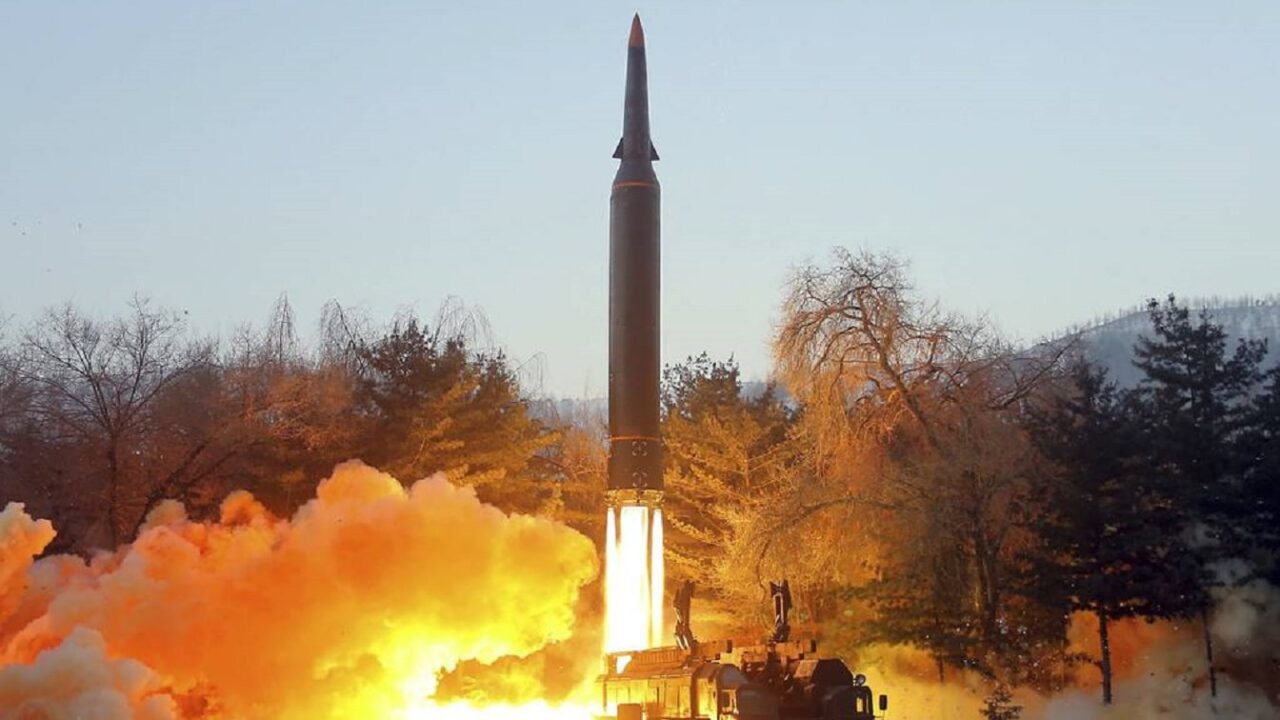While it might not drive the headlines or click traffic that it used to – without Donald Trump and Kim Jong-un threatening each other with nuclear war, the ‘appeal’ just isn’t there – North Korea is still a threat the United States must take very seriously.
And while the Biden Administration doesn’t seem that interested in dealing with the Kim regime at the moment – considering it has a full national security plate these days – it seems Pyongyang is eager to remind Washington that its nuclear forces will continue to advance in the months and years to come. Indeed, North Korea finally stated out loud what most Kim watchers already knew: Pyongyang declared that it would never give up its nuclear weapons in any sort of negotiation and that it is now a full-fledged nuclear weapons state.
To be fair, Pyongyang had already enshrined in its constitution years back that it was a nuclear power and said consistently for some time that it won’t give up its nukes. Nonetheless, yesterday’s announcement from Kim Jong-un was much more authoritative, as it was part of a new nuclear policy law. North Korea also laid out the conditions in which it might even launch a preemptive nuclear strike, something many experts thought was part of Pyongyang’s overall strategic thinking. And just to spice things up – and try to show it would be a ‘responsible’ nuclear power – it codified that the Kims would never sell their nuclear technology.
So, where does this leave us with North Korea? Is it time to accept the Kim family as nuclear power, or are more sanctions to get them back to the bargaining table in order?
19FortyFive asked some of the top experts to share their thoughts in the below symposium. As more responses come in, we will add them below.
Bruce Bechtol, Professor, Angelo State University: “North Korea remains defiant when it comes to their nuclear weapons.
Past behavior hinting that “eventually” they would dismantle their programs was only meant to gain more concessions from the United States. The North Korean leadership has invested far too much time and money into both Plutonium and HEU weaponization programs to simply walk away.
The only thing that would make that happen is for overarching and unreasonable concessions to occur. Even then, Pyongyang’s lack of transparency likely ensures that some of the nuclear weapons would be likely to remain – though hidden from inspectors. Thus, North Korea’s recent announcement comes as no surprise and is typical of the rhetoric spouted when talks (or lack of talks) are at an impasse.
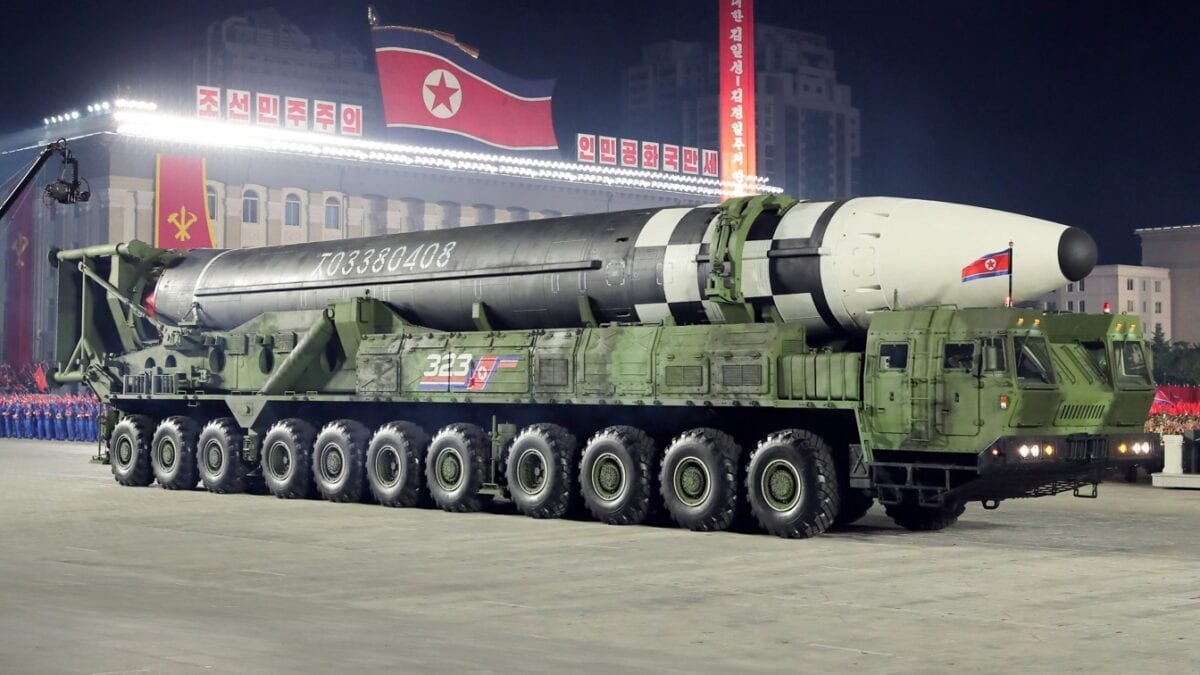
North Korean Hwasong-16 ICBM. Image Credit: KCNA/North Korean State Media.
If new talks occur, North Korea has now assured itself a position that takes all involved parties back to the same place they were several years ago – the beginning (again).”
Bruce Bennett, Rand Corporation: “It is no surprise that Kim Jong-un is refusing to denuclearize. He has said he would not denuclearize many times in the past, but he still tempted the U.S. government with negotiations, seeking concessions from the United States. But since he reportedly did not bring North Korean nuclear experts to those negotiations, he apparently viewed them as a way to gain his desired recognition of North Korea as a “nuclear power,” and had no intent to denuclearize. So much for U.S. hopes and dreams. In one poll, 70 percent of South Koreans did not expect Kim to denuclearize, while in another poll, 90 percent of South Koreans thought North Korean denuclearization is unlikely.
The problem is that North Korea doesn’t just possess nuclear weapons: It threatens to use them.
For example, on Thursday, North Korea’s parliament passed a law that included “a provision requiring North Korea’s military to launch nuclear strikes if the leadership comes under attack.” While this is not a particularly surprising deterrent threat against outside intervention, it is worrisome in large part because of growing instability in the North that could trigger North Korea limited nuclear weapon use either in response to internal threats or as a diversionary measure because of internal threats. And the new law justifies preemptive nuclear weapon use, a threat that destabilizes future regional crises.
These concerns must be coupled with the North’s nuclear weapon production going “full steam ahead,” according to the chief of the International Atomic Energy Agency. Whether North Korea has enough fissile materials for 45 nuclear weapons as one expert posits, or for over 100 per a reported U.S. intelligence estimate, these numbers are well beyond what North Korea needs to deter U.S. and/or South Korea-initiated military action against the North.
On a recent trip to South Korea, I asked various audiences: “How large a nuclear attack would North Korea need to threaten against the South to deter South Korean conventional military attacks on the North?” The most common answer was “0”: My audiences saw little to gain and much to lose with military attacks on the North. And I can see no interest in the United States for risking a nuclear weapon exchange with the North—nothing of worth for the U.S. to gain.
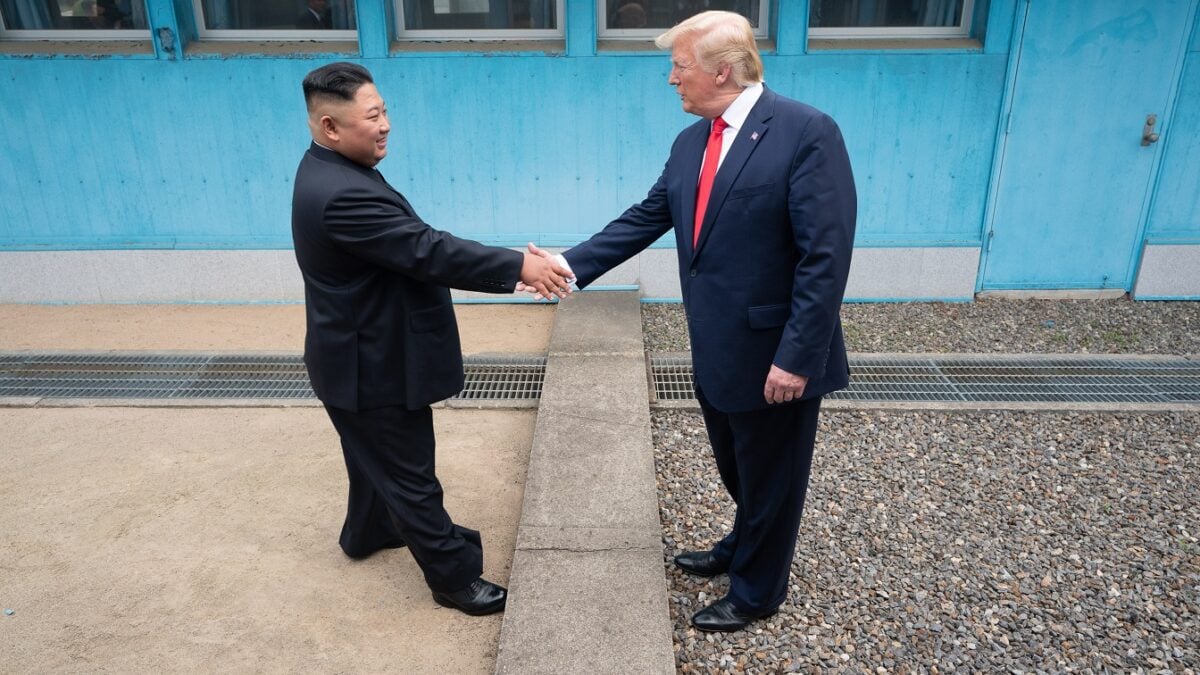
President Donald J. Trump shakes hands with Chairman of the Workers’ Party of Korea Kim Jong Un Sunday, June 30, 2019, as the two leaders meet at the Korean Demilitarized Zone. (Official White House Photo by Shealah Craighead)
We must therefore worry that Kim’s continued nuclear weapon build-up is more for offensive than defensive purposes. While Kim is sufficiently risk averse to avoid offensive nuclear weapon use in normal circumstances, what might he do if facing internal threats, especially from the North Korean military. Ordering his military to invade and attack South Korea could divert them from attacking Pyongyang in such circumstances. Since he almost certainly can’t win such a war using only conventional forces, he may hope that his nuclear weapons would allow him to change the peninsula regional balance, especially if the South Korea/U.S. alliance shows fissures in the future.”
James Jay Carafano, Vice President for the Heritage Foundation: “Never say never again is more than a movie title. It is difficult, if not impossible, to envision a future where North Korea is ever allowed to be treated like a normal nation and enjoy the benefits of global intercourse and retain a nuclear arsenal whose sole purpose is to threaten and blackmail its neighbors. The stability and security of Northeast Asia are too important. An eternal commitment to sustaining a nuclear arsenal is a permeant commitment to isolation, and it is unclear if an isolated North Korean regime can sustain itself in perpetuity. Its a self-imposed death sentence.”
Ted Galen Carpenter, Senior Fellow, CATO Institute: Kim Jong-un’s statement that North Korea will never give up its nuclear weapons should not have come as a surprise to anyone.
Since the country has officially declared that it is now a nuclear-weapons power, the United States and its allies need to move on from the quixotic goal of getting Pyongyang to abandon its nuclear ambitions. For nearly three decades, Washington has led an international effort to isolate North Korea until it agrees to a complete, verifiable, and irreversible end to its nuclear program.
That unrealistic demand has prevented the development of a normal relationship between the two countries, thereby exacerbating tensions in an already volatile geopolitical environment. Indeed, the insistence on total denuclearization was the main factor that torpedoed President Donald Trump’s initially promising effort to achieve a rapprochement with the Hermit Kingdom.
Biden administration policymakers need to accept the reality that North Korea is unlikely ever to give up its small nuclear arsenal. Kim and his associates fully comprehend how the United States treats nonnuclear adversaries. Washington’s regime-change wars against Serbia, Iraq, Libya, and Syria highlighted the danger of not possessing a nuclear deterrent.
The Libya episode was especially enlightening to North Korea’s leaders. When Muammar Qaddafi relinquished his country’s embryonic nuclear program, the United States and its Western allies responded by lifting sanctions and readmitting Libya to various multilateral institutions. However, just a few years later, Washington and other NATO powers helped insurgents overthrow Qaddafi’s regime, leading to the dictator’s torture and brutal execution.
It is unrealistic to expect Kim to put his neck into a similar noose.
Like it or not, North Korea is now a member of the exclusive global nuclear-weapons club, and it will remain so.
Daniel L. Davis, Senior Fellow, Defense Priotories, Former LT. Colonel, U.S. Army: “This declaration simply puts an official seal on what we’ve known is true for over a decade: North Korea is not going to give up what it considers its sole guarantee for regime survival. America’s policy of ‘maximum pressure,’ employed under one name or another by nearly every president since North Korea passed the nuclear threshold, has been an abysmal failure. Virtually every Administration has set a policy goal to see the complete, verifiable, and irreversible denuclearization of North Korea.
That was always an unrealistic objective, as it ignored patent reality: North Korea has nuclear weapons and isn’t going to give them up. The good news, however, is that our nuclear arsenal is more than sufficient to deter North Korea indefinitely and assure our security. The best thing we could do is seek inter-Korean rapprochement, encourage the improvement of North/South interaction, and slowly seek normalized relations – as we have successfully done for decades with China and the USSR/Russia. The worst thing we could ever do would be to try and use force to compel Kim to give up his weapons, which would likely spark the war we’ve always said we wanted to avoid.
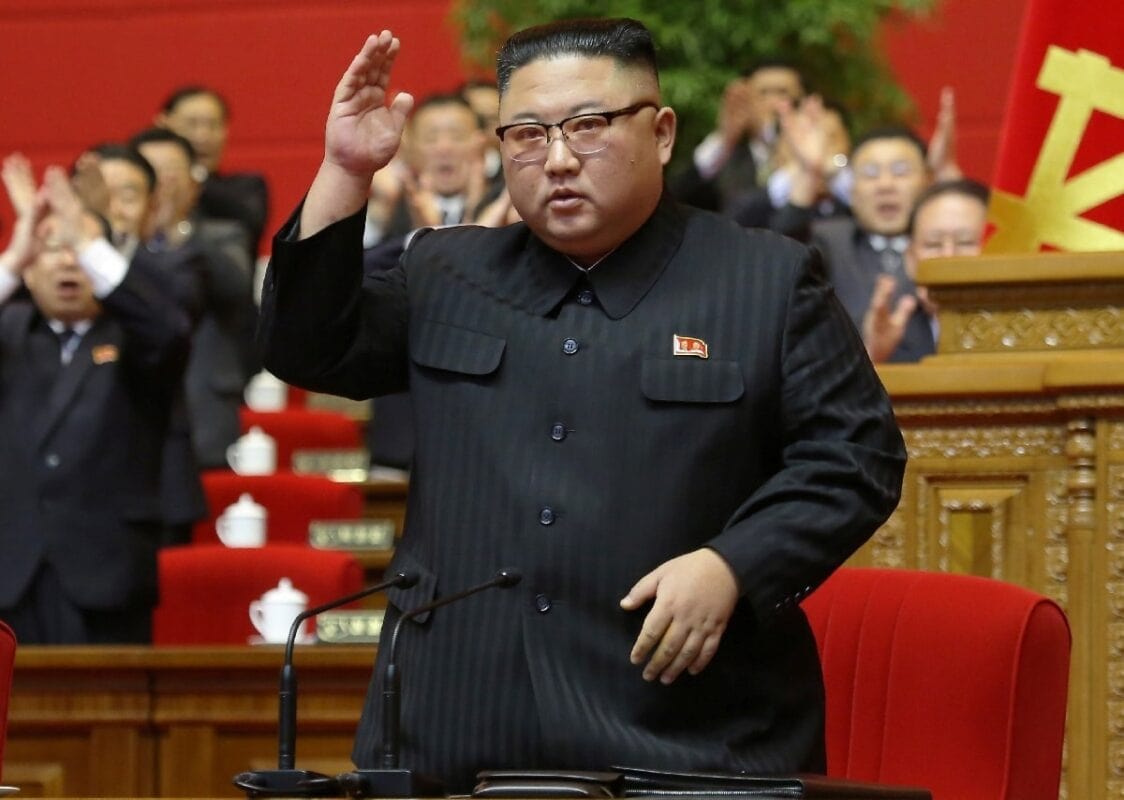
Image: Creative Commons.
We’ll stay safe as long as we don’t do anything foolish, like initiate a war.”
Fred Fleitz, Vice Chair of the America First Policy Institute’s Center for American Security and former CIA analyst: “There is little doubt that the Biden Administration’s negligent North Korea policy coupled with its foreign policy failures led to a surge in North Korea’s missile and nuclear programs, including Kim Jong Un’s recent statement that his country would never relinquish its nuclear weapons.
This is a far cry from the Trump years when Kim committed to giving up his nuclear weapons program, ceased nuclear tests, and ended most missile tests, including all tests of long-range missiles.
Biden mocked Trump’s accomplishments on North Korea and refused to build on them. He snubbed Pyongyang by naming a part-time special envoy. Secretary of State Blinken has ignored North Korea.
It, therefore, was not a surprise that belligerent actions by North Korea surged as the perception of Biden as a weak president grew.
The North began to surge missile tests last fall after the disastrous U.S. withdrawal from Afghanistan. It tested at least 34 missiles so far in 2022, the most ever in one year. In March, North Korea began excavation to regain access to its Punggye-ri underground nuclear test site. And now, the North has withdrawn its commitment to denuclearize.
President Trump did not solve the nuclear threat from North Korea, but his leadership considerably lowered tensions and created a chance for a diplomatic solution. President Biden’s foreign policy incompetence squandered what Trump accomplished. Let’s hope the Biden Administration responds to North Korea with high-level engagement and strength, and not the appeasement we have seen in its efforts to get a new nuclear deal with Iran.”
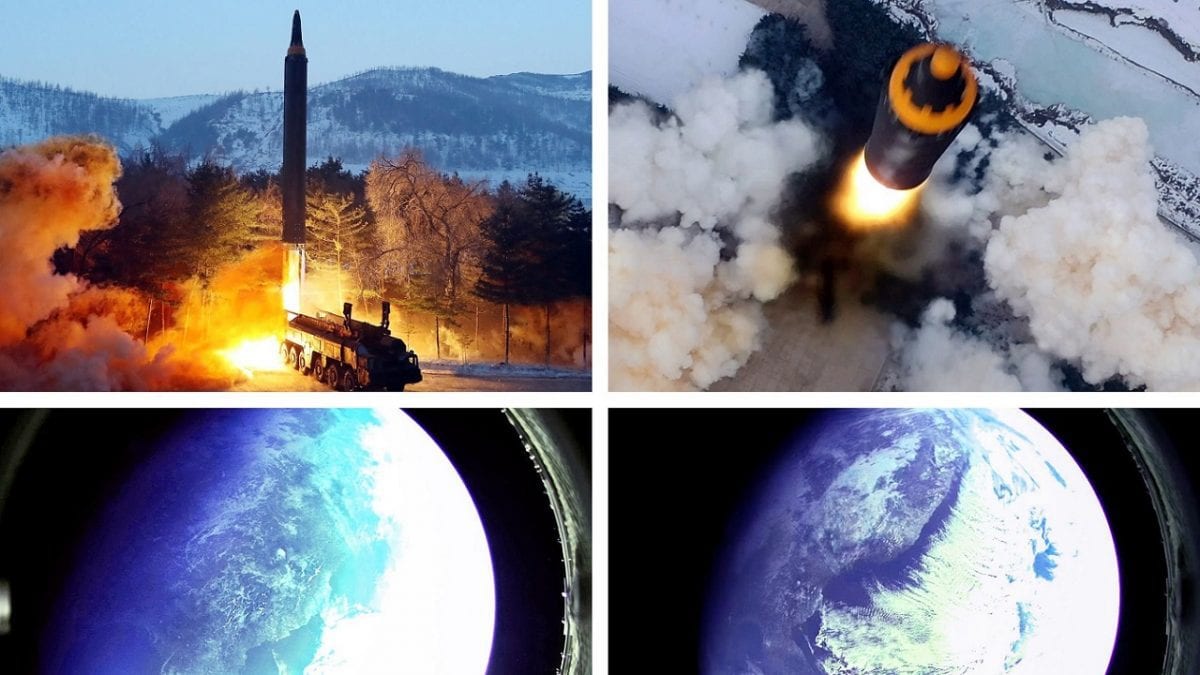
Hwasong-12. Image Credit: KCNA/North Korean State Media.
Wallace Gregson, Former Assistant Secretary of Defense, Obama Administration, Retired LT. General, U.S. Marine Corps: “North Korea recently announced that it would never give up its nuclear weapons. Reports indicate that they passed a new law declaring itself a nuclear weapons state and added that this is “irreversible”.
This should have surprised no one.
Internal power dynamics in North Korea, a need to be able to command global attention, and the profitable business of nuclear and weapons proliferation demand possession of an ever-improving ability to deliver nuclear weapons at a global range. Being useful, of not formally allied with autocrats in China and Russia is also a factor. A case could also be made for deterrence, but we have some experience with the defensive advantages of North Korea’s mountainous terrain. It’s hard to think of a good reason to invade conventionally armed North Korea.
A North Korea without nuclear weapons commands little attention, despite its conventional threat to South Korea. Their army is not what it used to be, thanks to malnutrition and other issues, but they do pose a significant threat to South Korea’s capital. In the past, they executed a submarine attack and sank a South Korean vessel. They also shelled one of the Northwest Islands with additional fatalities.
Simply put, they are a dangerous but manageable conventional threat.
They achieved their nuclear weapons status in large part thanks to Pakistan’s A Q Khan, a proliferation entrepreneur. North Korea learned that art well. Business in this blackest of black markets is very good, and it keeps the North Korean elites in their accustomed luxury.”
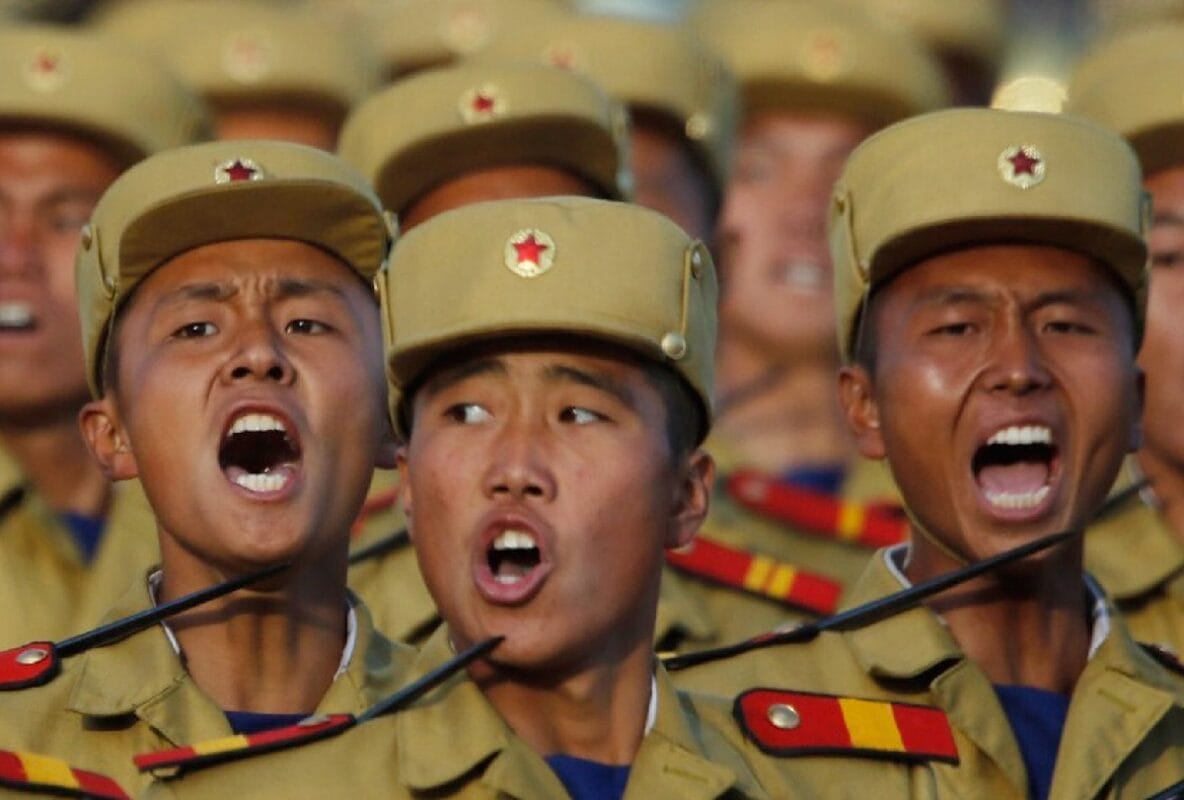
Image Credit: KCNA/DPRK State Media.
Rebeccah L. Heinrichs, Senior Fellow, Hudson Institute: “The Biden administration is reacting to foreign crisis after crisis, really a cascade of crises, and it really is remarkable that North Korea’s resumption of testing long-range missiles early this year after four years of quiet barely made the news.
Nobody should be under the illusion that the Kim regime would give up nuclear weapons without being made to, so there is no surprise here. But that doesn’t mean we just resign ourselves to “accepting” them as a normal nuclear state or believe them when they breathlessly declare how they’ll be a responsible nuclear state. North Korea is a gulag with nukes and an active criminal weapons proliferator. What the United States and the West should face up to is the grim geopolitical picture coming into clearer view, and that’s that there is a China-Russia convergence, and they are explicitly deepening ties with rogue states North Korea and Iran to leverage them against us.
How we approach those rogue states will help or hurt the China-Russia effort to break the US-led order.”
Bruce Klingner, former CIA Deputy Division Chief for Korea, Senior Research Fellow, Heritage Foundation: “Kim Jong Un’s statement was an affirmation of existing North Korean nuclear doctrine rather than a change.
The regime had already codified its status as a nuclear state during the 2013 revision of the North Korean constitution. Kim’s declaration also mirrors much of the regime’s 2012 Law on Consolidating the Status of a Self-Defensive Nuclear Weapons State.
While Pyongyang has often emphasized its nuclear weapons were for deterrence, it has also long described its nuclear arsenal had a dual purpose of “trusted shield” and “treasured sword” for deterrence and preemptive attack against the United States and its allies. Since at least 2013, the regime has threatened preemptive attacks with nuclear weapons. Pyongyang announced in 2016 and 2017 that it had conducted missile exercises simulating preemptive nuclear attacks over South Korea and Japan.

Image: North Korean State Media.
Pyongyang has also stated for decades that it would never denuclearize. The failure of eight previous international denuclearization agreements with North Korea and the regime’s ongoing violation of 11 UN resolutions requiring denuclearization do not bode well for either U.S. or South Korean diplomatic attempts.
However, neither Washington nor Seoul should abandon their efforts, in conjunction with maintaining deterrence and sanctions enforcement.”
Anthony Ruggiero, Senior Director, Nonproliferation and Biodefense Program, Foundation for Defense of Democracies (FDD), and former director for North Korea (2018-2019) on the National Security Council: “The Kim Jong Un regime on Thursday declared itself a “responsible nuclear weapons state” while also threatening the United States, South Korea, and Japan with preemptive nuclear strikes. The new law drops the façade that North Korea pursued a nuclear weapons program to defend itself against nuclear threats from Washington. Pyongyang also said it would not deploy nuclear weapons outside its territory and would not share or transfer relevant technology. The world’s foremost proliferator’s commitment to non-proliferation rings hollow since Pyongyang renewed long-range missile cooperation with Iran and built a clandestine nuclear reactor in Syria that was destroyed by Israel.
Some experts will claim that the new law shows that the U.S. sanctions policy is not working. But sanctions pressure on North Korea has been virtually non-existent since then-President Donald Trump embraced summit-level diplomacy. Biden’s decision to continue his predecessor’s policy was a mistake. While Kim is not interested in denuclearization, a robust sanctions policy is still worth pursuing because it decreases resources and inputs into North Korea’s nuclear weapons and ballistic missile programs. The Biden administration should begin by rebuilding the diplomatic coalition and then target Pyongyang’s overseas representatives and funding streams, including its coal sales and export of workers.”
Roger Zakheim, Washington Director, Ronald Reagan President Foundation: “This is a case where North Korea’s words match their actions. For decades and across US administrations, North Korea has used its nuclear program to entrench its brutal regime and intimidate its neighbors; it is the linchpin to the regime’s staying power. The free world has at times deluded itself into thinking otherwise despite North Korea’s conduct and rhetoric.”
Expert Biography: Harry J. Kazianis (@Grecianformula) serves as President and CEO of Rogue States Project, a bipartisan national security think tank. He has held senior positions at the Center for the National Interest, the Heritage Foundation, the Potomac Foundation, and many other think tanks and academic institutions focused on defense issues. His ideas have been published in the New York Times, Washington Post, Wall Street Journal, Newsweek, CNN, CNBC, and many other outlets across the political spectrum. He holds a graduate degree focusing on International Relations from Harvard University and is the author of the book The Tao of A2/AD, a study of Chinese military modernization.
Note: This piece was updated on 9/12/2022 to include a new contribution from CATO scholar Ted Galen Carpenter.

